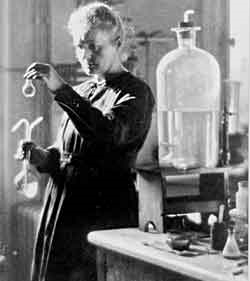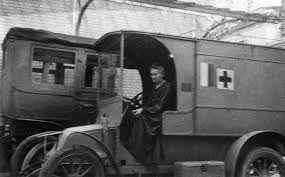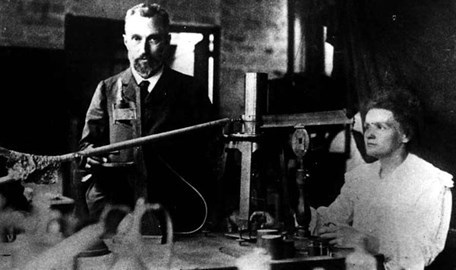Marie Curie
by Jacob from San Diego

|
| (pubs.acs.org ()) |
"Nothing in life is to be feared, it is only to be understood. Now is the time to understand more, so that we may fear less." ("Marie Curie." BrainyQuote.com.). Marie Curie has not only inspired thousands, but she also saved thousands. Starting out in a struggling family, it is a shocking that she would one day influence the field of physics and chemistry so greatly. Marie Curie was born in Warsaw, Poland on November 7, 1867 and she had three sisters and one brother. Marie Curie married Pierre Curie in 1895. She discovered the elements radium and polonium with her husband, won two Nobel Prizes, saved lives in World War I, and found that radiation can cure cancer. She died near Sallanches, France, but was later moved to the Pantheon crypt. Marie Curie won her first Nobel Prize in 1903 and her second in 1911. Not only the first woman to win a Nobel Prize, but Marie Curie also was the first person to win and share two Nobel Prizes, and one of the only people to win two Nobel Prizes in two different categories. A true hero must possess perseverance in times of hopelessness and selflessness. Marie Curie is deserving of the title hero, because of her intelligence, her care for others, and her strong will in difficult situations. Marie Curie should be recognized as a "hero", because of her intelligence. An example of Marie Curie's intelligence is seen when she won the Nobel Prize in physics in 1903 and became, "...the first woman to ever receive the honor. In 1911, she was the sole winner of the Nobel Prize in Chemistry. Marie Curie became the first person to win or share two Nobel Prizes. She shares the distinction of getting two Nobel Prizes in two different categories with just one other person, Linus Pauling..." (Yannuzzi 95). Marie Curie was the first person to win two Nobel Prizes, as well as the first person to win two Nobel Prizes in two different categories. She accomplished feats that others could only accomplish many years later. She is hardworking and exceedingly wise, which can be recognized in her exploits. When Marie Curie won her first Nobel Prize, women were still considered inferior to men. Yannuzzi mentions how, "The very idea of a woman entering the field of science was peculiar, and the notion that she might compete with her male colleagues was objectionable, That she [Marie Curie] would win in the race to announce a new discovery was downright offensive to many scientist working in that era." (Yannuzzi 73-75). Many scientists didn't like the fact that Marie Curie was a woman and she won the Nobel Prize, but ultimately her intellect helped many look past her gender and recognize her for her contributions (Yannuzzi 115). Whether she knew it or not, Marie Curie helped progress women's rights with her great intelligence and achievements. In the start of her career, Marie Curie had a suspicion that pitchblende contained more elements than just uranium; so Marie and Pierre Curie set off to investigate. In a barely adequate shed, "They ground up samples of pitchblende, dissolved them in acid, and began to separate the different elements present, using the standard analytical chemistry techniques of the time. Eventually, they extracted a black powder 330 times more radioactive than uranium, which they called polonium." ("Marie Curie the Scientist."). Applying her and her husband's knowledge in chemistry, Marie Curie was able to actually discover a new element and was able to name it what she wanted, which was Polonium, after Poland, because she was born there. She worked hard and due to her efforts she received the privilege to fill out part of the Periodic Table. Utilizing her intelligence, Marie Curie not only won two Nobel Prizes, but she also found two elements, and had become the first woman to do numerous things. With all her contributions to science, she is absolutely deserving of the title "hero".
|
| (www.weblessons.com ()) |
Despite Marie Curie's long list of triumphs, she still devoted many years of her life helping and caring for complete strangers. After the start of World War I, Marie Curie wished to help in some way. She was:
"Unable to continue her experiments after the outbreak of World War I and eager to be of service, she received approval to operate X-ray machines on the battlefield so that the wounded could receive immediate treatment. It was exhausting and dangerous work, but within two years she had established two hundred permanent X-ray units throughout France and Belgium." ("Marie Curie." Contemporary).
Marie Curie put herself in harm's way, in battlefields, to operate X-ray machines to help save injured soldiers. She worked hard to establish two hundred permanent X-ray machines which rescued many lives. Without her help, hospitals would have had to gone many years without the equipment, potentially killing soldiers due to the inability to locate exact injuries (Yannuzzi 100). Her endeavors in World War I demonstrate her care for people she didn't even know. During World War I, Marie Curie also created X-ray cars, that she named Petite Curies, to treat and care for thousands of soldiers. She used them to, "...set up X-ray facilities along the front lines. Now soldiers who fell in battle could be examined and their wounds properly diagnosed. Marie Curie's effort saved the lives and limbs of thousands of soldiers wounded during World War I." (Yannuzzi 101-102). Because Marie Curie took care of the soldiers, she saved not only the lives of thousands, but she changed their lives too. Many people that would have lost their limbs due to an injury, would get to keep their arm or leg, thanks to her efforts in the war. An illustration of Marie Curie's care for others can be seen in the later years of her life. Marie Curie worked arduously to help others and, "Except for World War I, during which she drove an ambulance, Curie spent the remainder of her life studying the role of radium therapy." ("Marie Curie." World of Health). Marie Curie could have just retired after all of her great awards and achievements, but instead she worked in World War I driving ambulances and saving lives. She then spent the rest of her life studying radium therapy and found out that radiation could cure cancer ("Marie Curie and the radioactivity"). With all her contributions already, it is amazing that she still spent years of her life helping others and caring for strangers. Because of Marie Curie's selflessness and care for others, she helped save thousands and found that it is possible to cure cancer with radiation. Her efforts reflect the true hero inside of her for all to see.

|
| (www.findingdulcinea.com ()) |
Intelligence and her care for others isn't all that defines Marie Curie as a hero. Her strong will strengthens her title as a hero. During Marie Curie's years in college, she did not have much. In her small apartment, "Marie survived on forty Polish rubles a month her father sent. This modest sum had to pay for rent, food, books, paper, medicine, clothing, and any other necessary items. Her room had no running water, and her only source of heat was a small stove she lit only when she had enough money to buy a stack of coal." (Yannuzzi 39). Surviving in these brutal conditions, it isn't hard to imagine how Marie Curie struggled. She was surviving on what would be about half a dollar today. Yet regardless to this harsh living environment, Marie Curie still weathered this difficult time and was able to achieve top honors in her class (Yannuzzi 41). With her beloved husband's death about six months prior, Marie Curie, "...stood for the first time at the podium in the physics lecture hall filled with students, photographers, colleagues, and spectators eager to hear and see the first woman teach at the famed Sorbonne. She began where Pierre had left off six months earlier. At the conclusion of her lecture she left the podium to the thunder of applause." (Yannuzzi 87). Pierre Curie's death struck Marie Curie monumentally, but she eventually came back from her terrible loss and continued Pierre Curie's work. She had to have been especially strong to get back up and continue what her husband was doing before his death, convincing one of her strength of will. Not long after finding Polonium and fueled with a thirst for knowledge, the Curies decided to spend, "...the bulk of their life savings to purchase waste ore from Czechoslovakian mines...The exhausting process [of refining and purifying pitchblende] took a dire physical toll upon the couple, and this, along with the arrival of their daughter, Irene, was nearly too much for them. Only Marie Curie's intense determination held them together." ("Marie Curie." World of Health). Even with the odds against her, Marie Curie seemed to constantly pull through. She wears herself thin, but still succeeds in reaching her target. She has so much passion in difficult and unknown territory, it allows her to keep herself and everyone around her staying on the track to success. With all the struggles and hardships she has faced, Marie Curie has repeatedly been able to finish what she started. It is these successes in times of hopelessness that determines Marie Curie's heroism.Through her brilliance, devotion to strangers and her perseverance it is evident that Marie Curie is a hero. Marie Curie's biggest gifts to the world has to have been the discovery of radium, polonium, and her discovery that radiation can cure cancer. Marie Curie almost always excels at what she does thanks to her seemingly unbreakable concentration (Yannuzzi 11-12). In her high school years, she was, "...an outstanding student who graduated at the top of her high school class when she was only fifteen. She then spent eight years working as a tutor and a governess to earn enough money to attend the Sorbonne in Paris." ("Marie Curie." Contemporary). Marie Curie was a hard working student and inspires me to be one too. She tends to take the less traveled road and has always worked to the best of her ability. Marie Curie inspires me to reach for my goals and challenge myself in everything I do. Furthermore, Marie Curie's greatness can be commonly seen in everything she does. Even working with her husband, Marie Curie's work outshines:
"In collaboration with her physicist-husband Pierre Curie, Marie Curie developed and introduced the concept of radioactivity to the world. Working in very primitive laboratory conditions, Curie investigated the nature of high energy rays spontaneously produced by certain elements, and isolated two new radioactive elements, polonium and radium. Her scientific efforts also included the application of X-rays and radioactivity to medical treatments" ("Marie Curie." World of Chemistry).
Whenever Marie Curie was in unexplored science, she worked hard and paved paths for future generations. Her actions motivate me to be a leader, help others, and maybe one day be as successful as she was. When given poor conditions, Marie Curie discovered elements. When given a war, Marie Curie saved lives. When given a bar, Marie Curie raised it. From great fame to accomplishments many only dream of, Marie Curie is most certainly worthy of the title hero.Works Cited
"Marie Curie and the radioactivity, The 1903 Nobel Prize in Physics". Nobelprize.org.Nobel Media AB 2014. Web. 4 Feb 2016.
"Marie Curie." BrainyQuote.com. Xplore Inc, 2016. 8 February 2016. http://www.brainyquote.com/quotes/quotes/m/mariecurie389010.html
"Marie Curie." Contemporary Heroes and Heroines. Vol. 2. Detroit: Gale, 1992. Biography in Context. Web. 27 Jan. 2016.
"Marie Curie the Scientist | Biog, Facts & Quotes." Marie Curie. MarieCurie.org, 2016. Web. 03 Feb. 2016. .
"Marie Curie." World of Chemistry. Gale, 2006. Biography in Context. Web. 3 Feb. 2016.
"Marie Curie." World of Health. Gale, 2007. Biography in Context. Web. 3 Feb. 2016.
Yannuzzi, Della A. New Elements: The Story of Marie Curie. Greensboro, NC: Morgan Reynolds Pub., 2006. Print.
Page created on 2/13/2016 12:00:00 AM
Last edited 2/13/2016 12:00:00 AM
The beliefs, viewpoints and opinions expressed in this hero submission on the website are those of the author and do not necessarily reflect the beliefs, viewpoints and opinions of The MY HERO Project and its staff.




